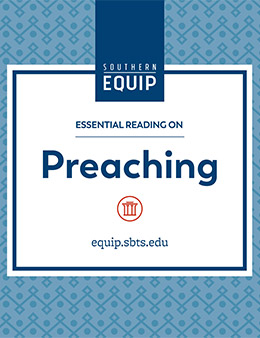I am a sinner preaching to sinners
I am not worthy to be a minister, but Christ was worthy for me. I do not and will not measure up, but Jesus perfectly measured up for me. The gospel is true for God’s people in the pew and it is true for me, his herald, as well.
I have served as a pastor around six years now, and one reality I still cannot reconcile is the notion of preaching to other people the myriad texts (all of them, so far) I find exceedingly difficult to obey myself. I preach about slaying the deadly viper of pride, but then I am proud of the way I exposited and communicated the text. I tell my people that they should pray without ceasing, and yet my prayer life is too often as inconsistent as summer rainfall in Kentucky. I preach about seeking God’s grace to lower the thermostat on our tempers after I have fired angry darts at my wife and children on the way to church, “Shut up, we’re going to worship!”
You get my drift. For a man called to preach God’s Word each Lord’s Day, this creates an existential crisis.
A particular Sunday presented a prime example of the tension that grips me when preaching God’s Word, a tension that always morphs into a full-blown fear that each week behind the sacred desk I am a trafficker in unlived truth. The text was Matthew 5:9 from the Sermon on the Mount: “Blessed are the peacemakers, for they will be called sons of God.” Great verse. Great opportunity to talk about selflessness in relating to others, displaying both love to God and love to neighbor and the like.
I made this application point: “When we are in conflict with others, we must talk less and listen more. We must learn to turn the other cheek in the way we respond verbally to others.” Ouch. I was getting paid to talk. And in conflict with others, sometimes I still struggle mightily to be like my Lord to turn the other cheek. On the way home that particular Sunday I kept thinking, I just preached on peacemaking and my own pastor (that would be me) falls miserably short of God’s glory in this area.
Dying men preaching to dying men
How are God’s undershepherds to come to grips with this daunting reality? How do we reconcile the all-too obvious truth that we are sinners preaching to sinners? How do we get some in our congregations over the notion that we are popes, we are monastics who descend from the cloister each week where we’ve been holed up all week, dodging the world, the flesh, and the devil? Sin dwells even in monasteries because sinners live there.
But many of the people to whom we are called to minister don’t really believe this about us, and when we sin—and we will—some of them write us off as phonies or Pharisees or worse. In the early months of my first pastoral ministry, a man told me I wasn’t qualified to be a pastor because I sinned. He seemed a bit stunned when I admitted that, though I believed his case for ministerial perfectionism unbiblical, I acutely felt the tension of of my standing as a saved-by-grace-sinner calling other sinners to walk God’s inspired line. I told him, “If you think that one thing you just mentioned is the worst weakness I have, you don’t know the half of it!”
Veteran pastor and counselor Paul Tripp, in his excellent book Dangerous Calling: Confronting the Unique Challenges of Pastoral Ministry, rode to my rescue by reminding me again that I am, in the words of the great Puritan Richard Baxter, a dying man called to preach to dying men. I must sit under my own preaching and teaching. My weekly preparation must never be less than devotional. And for any pastor to survive this sanctifying meat-grinder known as the pastoral ministry, it must never become clinical.
Pastors differ from garden-variety pew-sitters only in this fact: we have the unique privilege—and profound advantage—of being called to study in significant depth God’s chosen sin-killing, heart-renewing, image-restoring agent: the Bible. Yes, we are our own pastors, and we must listen to our preaching each week, which is to say, we must do far more than “handle” God’s Word: it must handle us as well. Thus, we must ask difficult questions about canceled sin that still clings to our hearts like barnacles on an old shrimp boat. We must ask God to use his Word to expose our besetting sins and hidden weaknesses so that we become more and more like Christ.
Pastors are paper plates
And we must remind our people that, despite popular misconceptions about the perfections inherent in God’s ministers, the inspired witness says we are mere clay pots, Walmart crockery, weak men in the midst of our own sanctification—just like the hearers of the sermons we preach. We stand in desperate need of wave upon wave of grace to wash upon the shores of our lives every moment, and we must not hide that face from our people behind a mask of subtle perfectionism.
Best of all, I do not have to be paralyzed by the expectation of perfection—whether it arises from my mind or the congregation’s— because Jesus was perfect for me. I am not worthy to be a minister, but Christ was worthy for me. I do not and will not measure up, but Jesus perfectly measured up for me. The gospel is true for God’s people in the pew and it is true for me, his herald, as well.
May God grant his ministers grace to hear and heed their own preaching.
This is adapted from an article that originally appeared at TGC.




